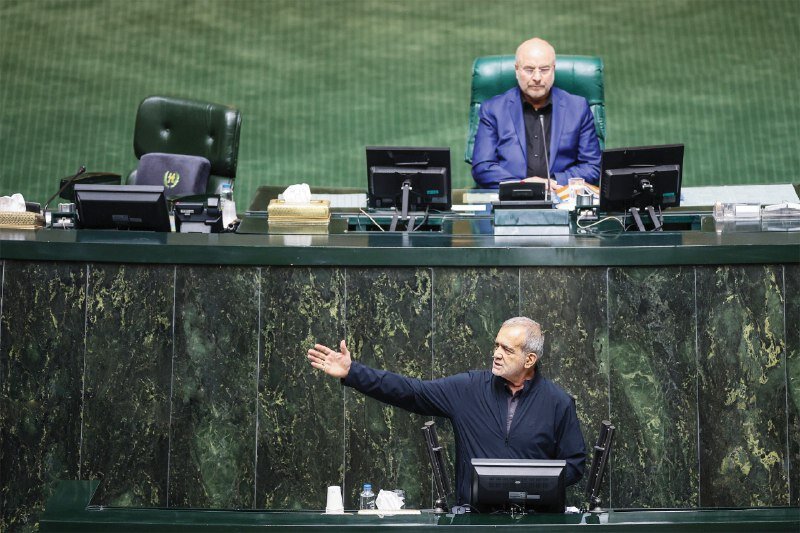By Mona Hojat Ansari
Iran's new president secures full cabinet approval from parliament

TEHRAN – The Iranian parliament has approved the president's proposed cabinet, marking the first time since 2001 that a full slate of ministers has been confirmed by lawmakers.
Voting began on Wednesday after 4 days of deliberation on the nominees. Three ministers from the late President Ebrahim Raisi’s cabinet have been approved to maintain their positions for the next four years including intelligence minister Esmail Khatib who garnered more parliamentary votes than he did when first nominated by the late Raisi three years ago.
This cabinet marks a new chapter for many, with a majority of the 19 ministers assuming ministerial roles for the first time. Notably, Frazaneh Sadegh's appointment as Minister of Roads and Urban Development marks a significant milestone, as she becomes the first woman to hold a ministerial position in 13 years.
President Masoud Pezeshkian said he was looking to create “national unity” when he presented his list of candidates earlier this month, 12 days after his own swearing-in-ceremony.
Pezeshkian is a figure close to the reformist faction. There was widespread speculation that his political leanings may give his proposed ministers a hard time getting approval from the conservative majority parliament, which was anticipated to nix at least two of the candidates.
"Those who wrote bleakly about the future of the cabinet predicted that the political divide would hinder the president's cabinet formation. However, we, the lawmakers, demonstrated that national interests supersede party politics. We voted for what's best for our country, not for our individual political affiliation,” Shahrokh Ramin, a representative of Damavand and Firoozkooh counties in the parliament, told the Tehran Times.
Perhaps Pezeshkian’s success with the MPs also has to do with the fact that his proposed cabinet did not solely consist of reformist figures. About 40 percent of his list is closer to conservative or neo-conservative factions, something that some prominent reformists took umbrage at.
Before voting began, Pezeshkian delivered a passionate speech to lawmakers, urging them to be less dogmatic and more open to dissimilar views. “Today I am the president but I was once disqualified to run for a seat in parliament,” the president said referring to his initial disqualification by Iran’s constitutional council from the 2024 parliament elections held in March. “That happened despite my deep respect and affection for the revolution and Leader,” he said before emphasizing that he is not asking the lawmakers to “change their viewpoints” but to consider the country’s long-term policies and plans. It is believed that Pezeshkian’s last-minute plea with the parliament was effective in making history since 2001.
“There were some MPs that still had misgivings about who they should say yes to. Dr. Pezeshkian’s words were extremely impactful and influenced the lawmakers’ resolve to take the necessary actions,” said Mohammad Saadaat Ebrahimi, a lawmaker representing Shooshtar and Gotvand. “The endorsement of all 19 proposed ministers marks a promising start for the president and heralds a strong partnership between the president and parliament over the next four years.”
Iran's hand strengthened in global affairs
The fact that the new Iranian president managed to form his cabinet with maximum cooperation from parliament, also holds significance in international politics. Iran is poised to retaliate against Israel for the regime’s assassination of Hamas Political Chief Ismail Haniyeh, who was killed hours after his presence at Pezesehkian’s inauguration ceremony on July 31. Tehran is also seeking to engage in talks with the West in order to terminate Washington’s illegal sanctions.
“Iran has conveyed a clear message to the world: the various branches of government are united. The support of parliament for the president is crucial for fostering dialogue and engaging in international relations. An administration backed by parliament operates with greater confidence, making it easier to tackle difficult decisions. I am extremely proud of how lawmakers have acted at this crucial time,” expressed Ahmad Fatemi, an MP from Mazandaran Province.
Tags

No comments:
Post a Comment